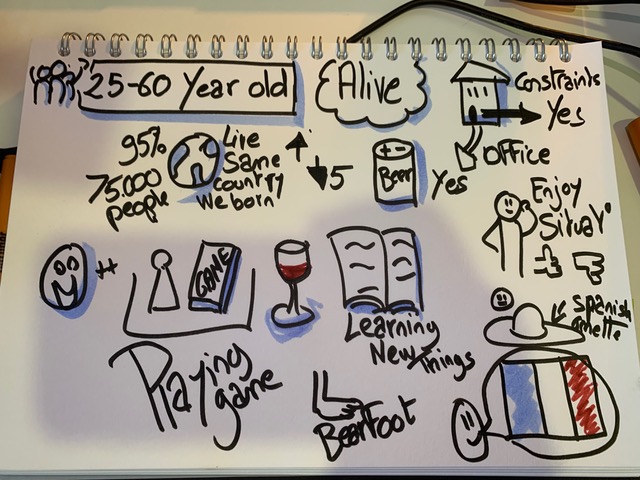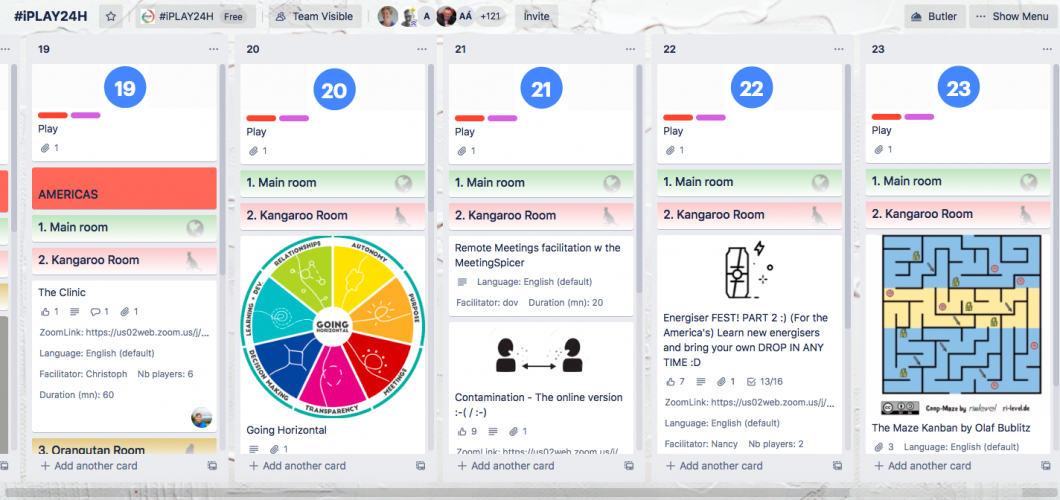This question came up when I was co-hosting and attended (part of) the 24-hour #Play14 The Big One online. I hosted and played games with people I never met before. We did silly things, played serious games, laughed hard, shared personal insights and gave each other honest feedback. And I felt immediately part of a strong community. Looking back at the event, I wonder why there is a sense of psychological safety in all these Play14 events (both online and offline).
What is psychological safety?
According to Professor Amy Edmonson (Harvard Business School), psychological safety is a belief that one will not be punished or humiliated for speaking up, with ideas, questions, concerns or mistakes. So it’s a very personal feeling and will be different to all of us.What is #Play14?
It is a “…worldwide gathering of like-minded people who believe that playing is the best way to learn, share and be creative”. Attending events will help you “… develop facilitation skills, increase your ability to accompany change in your organisation, foster your creativity and improve your capacity to innovate.” It started in Europe in 2014 with weekend-long unconferences and since COVID-19 we have been experimenting with online events. All events are run by volunteers. See www.play14.org for more details. Sketch of ‘Things in common’ game by Jerome Bourgeon
Sketch of ‘Things in common’ game by Jerome Bourgeon
Code of Conduct
The #Play14 code of conduct gives true guidance to what is expected from every participant:
• Be open-minded and ready to listen and learn from others.
• Feel free to propose, experiment and explain what you have in mind.
• Don’t high-jack, sabotage or ruin the learning experience of others.
• Behave appropriately and be a decent human being.
• Be ready to get serious fun and good laughs and don’t be shy about that!
With this code of conduct, #Play14 gives sets out clear expectations about the participants’ behaviour. It will create a community sense and participants who don’t adhere to the code will be dismissed.
What you can do
You can set a series of ground rules at the start of a meeting. Let your participants decide together what’s important for them to feel safe and how they will contribute. You might know this as a social contract. You use the rules to encourage positive behaviour and reduce the negative. Agreement on the rules will give participants a responsibility to behave in a certain way.
Open space
#Play14 events are ‘unconferences’. By using open space, participants are invited to contribute to the meetings. Participants are encouraged to post ideas for games that they would like to host in ‘the marketplace’, followed by a pitching process. The other participants can choose which games to attend. There is a lot of freedom and limited planning involved for #Play14 meetings.
What you can do
You can give participants control over (part of) your meeting. Control could be in the order in which topics will be discussed or how you fill in the meeting time. You could use simple techniques like dot voting to make it a democratic process.
Experiment
Trying out games, getting feedback and improving them is a big part of the #Play14 events. Even during this weekend’s event, that was set up within 3 weeks, we were still improving and taking decisions on the spot. It doesn’t have to be perfect. It’s more important that you give the experiment a chance and learn from it, together with others. Nobody will make a fool of you or is pointing a finger when things don’t work out as planned. Other participants will come up with suggestions about how to do things differently and maybe better next time.What you can do
You can start by embracing suggestions for improvements and show a willingness to try out new things. That will create a sense of being valuable and being heard. Some people might be hesitant to share their ideas in a wider group, so another way of sharing ideas might get more introvert participants over the line. Ask participants to send in their ideas before the meeting, in a chat message to the facilitator or by using a whiteboard without name tags.
People
Looking at the participants, there is a wide variety of job roles. I don’t have the data, but I sense that the majority of participants are working in an agile environment, often as a scrum master or agile coach. Other participants are teachers, trainers, laughing yoga instructors, instructional designers (or was it just me?), coaches etc. The common element is that they are all interested in learning with fun and are looking for games and activities to use in their work.
What you can do
You often can’t control who is attending your meeting or learning event. What you can do, is prime them for the meeting and get them in the right mindset. That might be the wording and visuals in your invitation, sending the participants something to do before the meeting or a personal phone call to explain what they can expect and what you expect from them. You can also choose an icebreaker for the start of your meeting that’s safe and playful, with or without introducing the topic.
Host
In #Play14 meetings, the event host welcomes the participants, starts with an energising or icebreaker activity and leads the market place. As soon as participants start hosting and playing games, the role of the event host changes into a producer/support role and assist with a debrief. The event host does play a key role in setting a welcoming environment and encouraging (not pushing) participants to contribute and facilitate games themselves. When the event host is facilitating a game themselves, they show vulnerability and a willingness to learn from feedback.
As a facilitator, you can set the tone for the meeting. Be vulnerable (tell them if you don’t know something), be welcoming and interested in your participants and be open to learning yourself. These simple things will help to create a safe environment for your participants.
Learn from #Play14
We can learn from the #Play14 events. With an agreed social contract, allowing participants to have more control, showing vulnerability as a facilitator and a willingness to learn yourself, you will help participants to feel safer.

